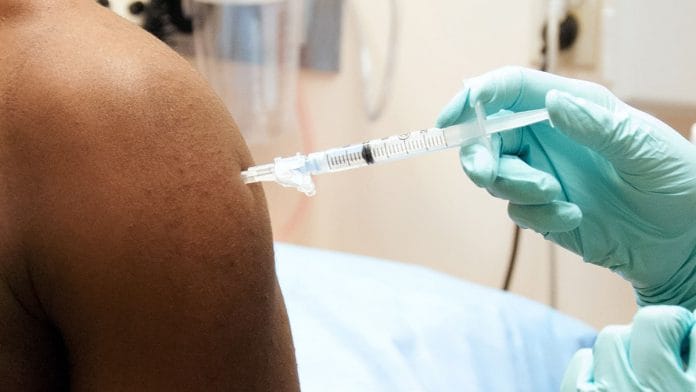Belgrade: Serbian President Aleksandar Vucic puts his country’s status as continental Europe’s frontrunner in getting vaccines into people down to one thing: looking east as well as west.
The Balkan country may look like an unlikely success story as the neighboring European Union gets mired in a fiasco over vaccinations. Yet Serbia’s history of balancing its geopolitical interests is paying off at a critical time.
Serbia has been an important bridge for China to gain a foothold in Europe, while the country is also a traditional ally of Russia and is aspiring to join the EU. Those relationships have allowed it to diversify vaccine sources and inoculate a bigger proportion of its population than any other nation in Europe after the U.K. Serbia has injected 6.8% of its 7 million people, more than twice the ratio in the EU.
Most of the 1.1 million doses imported by the government in Belgrade so far have come from China’s state-backed Sinopharm. Vucic says his refusal to join a chorus of leaders criticizing China at a security conference in Germany helped him establish good relations with Foreign Minister Wang Yi.
“I was the only one who didn’t accuse China of anything so we had a brotherly meeting—the foreign minister and me—and since then the Chinese support began for us, concerning the coronavirus and everything else,” Vucic said in a televised address to the nation last week.
The speedy rollout of injections to combat Covid-19 relative to the EU underscores the tension across the continent, and also the potential geopolitical consequences in its most volatile region. Already, the Serbian approach has its followers within the EU: neighboring Hungary became the first member of the bloc to approve shots made by Russia and China.
Serbia’s goal is to join the EU, though with an electorate already divided over membership, the pandemic risks pushing the country into the orbit of rival powers. Meanwhile, Belgrade has promised vaccine donations to Kosovo and Bosnia-Herzegovina, exposing the divisions again in former Yugoslavia that fueled the bloody wars of the 1990s.
The EU has pledged to give six prospective members in the western Balkans—including Serbia—70 million euros ($85 million) to buy Covid shots, but deliveries are facing delays. Instead of waiting for the EU’s help, Belgrade secured vaccine from China, Russia and the U.S. directly.
French President Emmanuel Macron acknowledged the problems Europe is having with rolling out vaccine programs before a lunch with Vucic in Paris on Monday. “I would have wished that France, Europe could have been more present on your side on the topic of vaccines,” Macron told Vucic and a group of reporters. “We Europeans must be even more efficient on this.”
The former information minister to the late strongman Slobodan Milosevic, Vucic called in favors when the Covid-19 crunch began, securing ventilators and protective equipment in the early stages of the contagion. He then ordered vaccines from three suppliers: Sinopharm, Russia’s Gamaleya and Pfizer-BioNTech.
Details on the Chinese and Russian vaccines are less transparent than the western ones, though health authorities in Serbia have sought to assure citizens that all the shots in use are safe and effective.
A week ago, Vucic said he met with China’s ambassador and “literally begged her,” for more deliveries. “Knowing President Xi, I believe that before May or June we’ll receive significant quantities of new vaccines from China.” Serbia is also now looking to start local production of the Russian vaccine.
The Serb leader controls the government and has tightened his grip on power in 2020 elections with a landslide victory, amid a boycott by some opposition parties that accuse him of autocracy. His pitch to voters, though, includes his ability to forge relationships across the geopolitical spectrum, with little regard to the feathers he might ruffle along the way.
In June, Vucic drew condemnation from pro-EU politicians for kissing the Chinese flag when an airplane delivered medical gear from Beijing to Belgrade. At the time he described the promise of solidarity from the EU, by far the biggest contributor of aid and investment to Serbia, as “a fairytale on paper.”
Providing vaccines to Serbia gives an important geopolitical win for China as it faces up to a less fractious and more Sino-skeptic West under U.S. President Joe Biden. In recent years, China has focused investment on infrastructure in the Balkans through its Belt and Road Initiative, including a rail link between Belgrade and Budapest in Hungary.
There is a perception of China being more prepared to help than the EU, said Faris Kocan, a foreign policy researcher at the University of Ljubljana. “It started with mask diplomacy and the narrative continues with vaccines, despite the fact that Balkan nations are strategically dependent on EU,” he said.
Serbia started to vaccinate on Dec. 24, days before the EU. It has contracts for 6.5 million vaccines, but the global scramble for jabs is hurting confidence that the deals will be honored, Vucic said. No vaccines have come through the multinational Covax initiative, which the Balkan state also joined early on.
German Chancellor Angela Merkel held crisis talks on Monday with pharmaceutical executives and European Commission officials as part of efforts to speed up the stuttering vaccination push. The EU’s 27 states collectively have inoculated 2.9% of the population compared with 14.7% in the U.K. and 10% in the U.S., according to Bloomberg’s Vaccine Tracker.
“People in the EU are good people, but luckily I had enough experience and knowledge to assume that it would turn out like this,” Vucic said. “This is a war for people’s lives but also for the future of every country.”- Bloomberg
Also read: China’s top diplomat warns Joe Biden not to touch internal affairs, calls it ‘red line’






